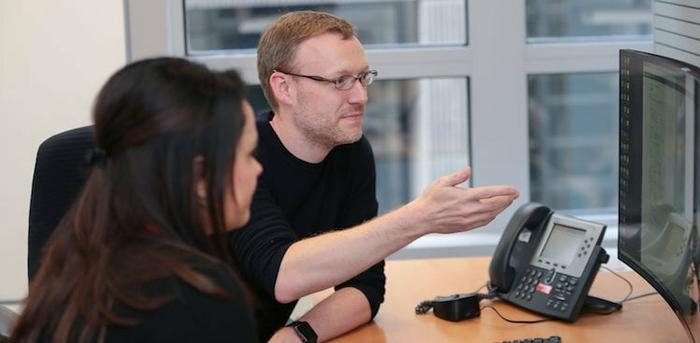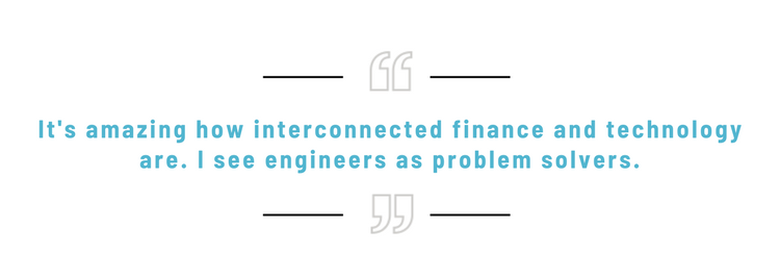
In partnership with Goldman Sachs, we're putting the spotlight on professionals who embody a personal mission to make things possible. Below, we talk to Christopher Mathie, a Goldman Sachs veteran who truly loves what he does. Don't miss the rest of the series, coming soon.
Today, Christopher Mathie might be responsible for running Goldman Sachs’ global Risk Technology team for the Prime Services Business, but 17 years ago he had only a vague idea as to what the financial services industry was all about. Growing up in a small remote village on the west coast of Scotland, even London’s vibrant financial district seemed like the stuff of dreams.
But Chris, a self-described computer geek, was always interested in technology and graduated with a software engineering degree from the University of Glasgow. As part of his graduation requirements, he had to find a summer internship at the end of his junior year.
As luck would have it, a team from Goldman Sachs visited his campus and Chris was impressed by how much passion they had for the company. He signed up for an internship and never left.
Problem Solvers
Chris brought a sense of wonder and curiosity to his summer projects, and he hasn't lost that enthusiasm. While he had always worked on team challenges at school, it was at the internship that he discovered how effectively groups of people could work together. Being able to put whatever he learned to practical use and picking up new concepts along the way was an eye-opening experience, Chris says.
He is especially keen on pointing out that technology and finance go hand-in-hand. “It’s amazing how interconnected they are. I see engineers as problem solvers,” Chris says. “No matter which level you are in the organization, from a summer intern to running a division or company, we’re all trying to solve problems. Over the years, it’s just become larger and more complex problems.” An example of a newer complex problem? Figuring out how to migrate some of Goldman Sachs’ computing tasks to the cloud.
Chris's job entails helping both external clients and internal risk managers calculate, manage, and provide transparency on the risks associated with margin financing. “My time is split between understanding the needs of our clients and how engineering can help meet those needs, and ensuring the team and I continue to stay up to date on new and emerging technology,” Chris says.
The Far Reach of Computer Engineering
The best part about computer science and engineering is a constant drive to learn the next new thing. Engineers who work on teams like Chris’s are rewarded by constant reinforcement that they are helping to build better software.
Chris says he will often consult a risk manager to figure out the challenges they're facing, after which his team comes up with an engineering solution that can be rolled out. “We can ask ‘how is that working out’ and they can say ‘this is great but can you add this.’ It's cool to be able to iterate and evolve into usable applications,” Chris says.
Even cooler? Several years ago, Chris spent six months in India to work with Goldman Sachs’ regional team there. In addition to exploring the area and the food, the assignment was crucial in developing an understanding of the importance of running global teams.
“The big takeaway for me was the cultural nuances you have to take into consideration when working with Bengaluru or London or New York," Chris says. “From a leadership perspective I need to make sure I’m being inclusive across all regions, not just focusing on the one in front of me.”
Future Leadership
A significant percentage of Goldman Sachs’ projects, including risk modeling, are rooted in software engineering, and Chris uses this as a huge selling point while volunteering for the firm’s Engineering Campus Recruitment Committee and Apprentice Initiatives. In collaboration with other members, Chris makes sure Goldman Sachs attracts strong candidates looking for a challenge and gives them an opportunity to discover what engineering is like within the finance industry, just like he received many years ago.
Chris is eager to talk to new graduates and future interns and employees to find out what will keep them engaged and excited to work at Goldman Sachs. And right now, that means he’s doing a lot of listening.
That might sound counterintuitive with his years of experience, but Chris doesn’t want to have any preconceived ideas about what’s important to people graduating today versus what was important to him when he graduated far too long ago, he says.
“Clearly I think this is a great place to have a career, but I want to make sure we continue to refine that experience for the next generation and the ones after that.”
